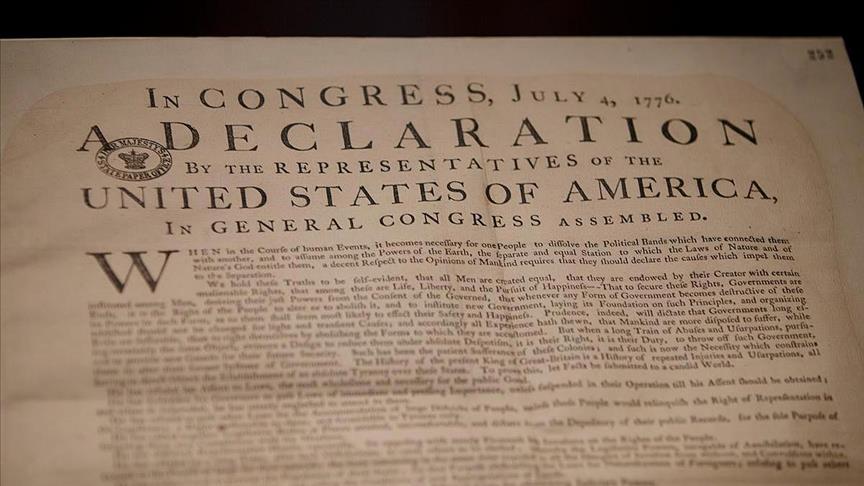 Thomas Jefferson, the principal author of the Declaration of Independence and the third president of the U.S., who first imagined Muslims to be citizens of the U.S
Thomas Jefferson, the principal author of the Declaration of Independence and the third president of the U.S., who first imagined Muslims to be citizens of the U.S
By Kasim Ileri
WASHINGTON
Debate about a theoretical American Muslim president was argued and settled as far back as during the very founding of the U.S.
But the controversy once again reared its head in when Republican presidential candidate, Dr. Ben Carson, said he would not “advocate” a Muslim holding the highest office in the land because such an individual would not be compatible with American values.
In his book, Thomas Jefferson's Qur'an: Islam and the Founders, Denise Spellberg shed light on the early debate while citing letters and conversations among some of the country’s Founding Fathers.
The chapter titled, "Can a Muslim be president of the United States" reveals how early leaders pushed hard to carve out a Constitution that was tolerant of non-Protestant Americans, particularly Muslims, being part of the newly independent state.
The question of whether to allow Muslims and non-Protestants to hold public office was fueled by domestic and international conjecture.
While the supreme law of the land was being drafted in 1787, the U.S. and European powers were struggling to deal with North African pirates, mostly Muslim, who were attacking colonial slave ships.
At home, nearly all of the 13 states that ratified the Constitution two years later in 1789, were promoting Protestantism as "the sole religion acceptable to the political office holders".
It was Thomas Jefferson, the principal author of the Declaration of Independence and the third president of the U.S., who first imagined Muslims to be citizens of the U.S., according to Spellberg
Jefferson's ideas were fiercely criticized by Confederalist states in the south, particularly South Carolina, thanks to geographical proximity to Virginia.
Jefferson was the governor of Virginia in 1779 and sponsored a bill that established religious freedom. It stipulated that all public office holders "be free to profess and by argument to maintain, their opinion in matters of religion and that the same shall in no wise diminish, enlarge or affect their civil capacity".
Records show, according to Spellberg, that Jefferson's bill found support in some northern states that were at odds with southern states that wanted to retain their share of slave holdings.
Jefferson's idea to exclude religion as a political qualification also played a crucial role in crafting Article VI of the Constitution: "No religious test shall be ever required as a qualification to any office or public trust under the United States."
It is crucial to note that three of the first four U.S. presidents – George Washington, James Madison and Jefferson – were among a handful of statesmen who defended the neutrality of the Constitution against religions.
Second President John Adams was among those opposed to the idea of non-Protestants holding political office.
The main objection against the new Constitution was that "prohibiting religious tests opened a door for Jews, Turks and infidels," to rule the country, according to a letter by James Madison sent to Jefferson.
It appears no one at that time was comfortable at the idea of a Muslim president.
But, unlike Confederalists in the south, the Federalists Party believed a Muslim in a senior public position would remain a theoretical possibility – never to be realized.
This sentiment contributed to their support for ratifying Article VI of the Constitution in 1789.
The conservative view may still exists, evident in Carson’s comments, but in the heat of a presidential race, it can be met with a switft and strong response.
Many, including presidential candidates from both major parties, and tens of thousands of others on social media denounced the doctor’s views.
“It took us too long to overcome the prejudice against electing a Catholic or an African-American president," said Democratic candidate Bernie Sanders, in reference to similar views expressed in the run up to John F. Kennedy being elected the first Catholic president, and Barack Obama before he became the nation’s first black to hold the office.
Sanders’ Democratic rival in the race, Hillary tweeted Article VI of the Constitution with a note. "Can a Muslim be President of the United States of America? In a word: Yes. Now let's move on. -H"
Even though Republican candidates Ted Cruz and Lindsey Graham also criticized Carson’s remarks, the famous doctor continues to stand by his anti-Muslim words that contradict the American historical experience and the country’s highest binding document.
Anadolu Agency website contains only a portion of the news stories offered to subscribers in the AA News Broadcasting System (HAS), and in summarized form. Please contact us for subscription options.

